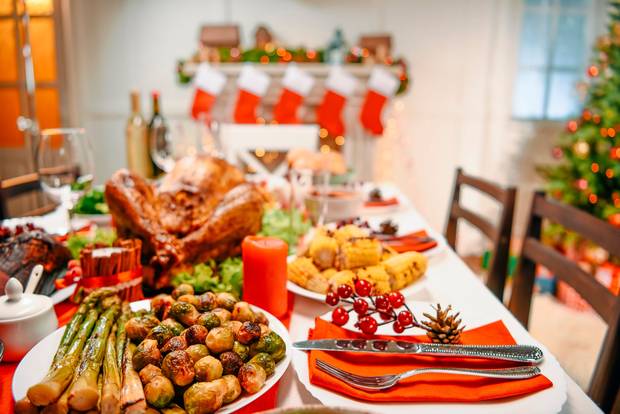
Don’t feel too guilty as you tuck into your Christmas dinner – the traditional turkey and trimmings can be relatively healthy and actually contains some superfoods.
The average person will consume around 6,000 calories on Christmas Day and add 4lbs (1.8kg) to their weight between tomorrow and the new year.
Leading dietician Sarah Keogh has outlined the healthiest way to enjoy Christmas Day with the most nutritious ingredients to delight any festive palette. But the advice is to relax the diet on December 25, as Christmas remains a time to indulge.
Ms Keogh, who runs Eat Well in Dublin city centre, said: “I don’t think anyone should worry about food too much on Christmas Day but, for guidance, there are plenty of nutrients in our Christmas dinner.
“Many of us will eat turkey and it really is a good option because it’s one of the lower calorie meats, and turkey legs are good for iron.
“If you’re eating ham and are concerned, trim off the fat from the meat, but be assured Christmas Day will probably be the occasion when you eat the most vegetables on a plate all year.
“Between Brussels sprouts and cauliflower, there’s so much goodness on your Christmas plate. Broccoli is good for vitamin C and fibre -it’s a cruciferous vegetable, along with Brussels sprouts, cabbage and cauliflower, and is cancer reducing.
“Brussels sprouts are brilliant, they’re full of antioxidants and a little iron. They’re great to eat and people really shouldn’t wait to eat them just at Christmas.
“Kale was really fashionable a few years ago and it’s great for iron and vitamin K, a nutrient that helps build and maintain healthy bones.”
Vitamin K’s most notable claim is its role in helping blood clotting, or coagulation.
The festive period presents the perfect excuse to nourish even loved ones who ordinarily turn their noses up at vegetables, Ms Keogh said.
“Carrots and parsnips are great for fibre and vitamin C. And people who don’t like vegetables generally enjoy these when they’re roasted,” she said. “If you cut parsnips thinly and roast them, it seems even those who don’t like vegetables love crunching them.”
For those who are able to avoid unhealthy snacks on Christmas Day, nuts are the perfect substitute.
“If you’re going to snack on something, nuts are a great source of fibre and nature’s multi-minerals,” she said.
“You’ll benefit from substances including iron and zinc, copper and magnesium, and some B vitamins. Almonds and hazelnuts are brilliant.
“Some of the snacks you could tuck into, like crisps and desserts, aren’t great in terms of nutrition but people shouldn’t worry about it for one, or a few, days over Christmas. If you can’t avoid chocolate, go for dark chocolate. If you hit 60-70pc cocoa, that helps lower blood pressure.”
During the festive season, alcohol will enter most homes and the dietician admitted there’s really “nothing healthy to say about alcohol”.
“If you want to drink wine for the antioxidants, you’d be much better eating grapes,” she said. “But again, the advice is moderation. The only concern would be if you were eating fatty foods and drinking all December or longer.”
Irish Independent

